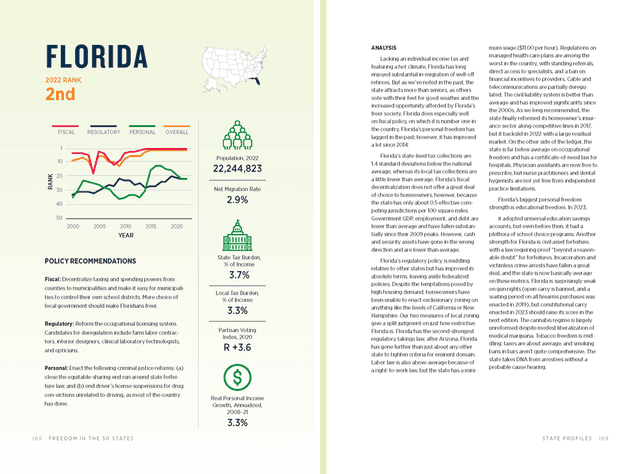Policy Recommendations
- Fiscal Decentralize taxing and spending powers from counties to municipalities and make it easy for municipalities to control their own school districts. More choice of local government should make Floridians freer.
- Regulatory Reform the occupational licensing system. Candidates for deregulation include farm labor contractors, interior designers, clinical laboratory technologists, and opticians.
- Personal Enact the following criminal justice reforms: (a) close the equitable-sharing end run around state forfeiture law, and (b) end driver’s license suspensions for drug convictions unrelated to driving, as most of the country has done.
Analysis
Lacking an individual income tax and featuring a hot climate, Florida has long enjoyed substantial in-migration of well-off retirees. But as we’ve noted in the past, the state attracts more than seniors, as others vote with their feet for good weather and the increased opportunity afforded by Florida’s freer society. Florida does especially well on fiscal policy, on which it is number one in the country. Florida’s personal freedom has lagged in the past; however, it has improved a lot since 2014.
Florida’s state-level tax collections are 1.4 standard deviations below the national average, whereas its local tax collections are a little lower than average. Florida’s fiscal decentralization does not offer a great deal of choice to homeowners, however, because the state has only about 0.5 effective competing jurisdictions per 100 square miles. Government GDP, employment, and debt are lower than average and have fallen substantially since their 2009 peaks. However, cash and security assets have gone in the wrong direction and are lower than average.
Florida’s regulatory policy is middling relative to other states but has improved in absolute terms, leaving aside federalized policies. Despite the temptations posed by high housing demand, homeowners have been unable to enact exclusionary zoning on anything like the levels of California or New Hampshire. Our two measures of local zoning give a split judgment on just how restrictive Florida is. Florida has the second-strongest regulatory takings law, after Arizona. Florida has gone further than just about any other state to tighten criteria for eminent domain. Labor law is also above average because of a right-to-work law, but the state has a mini-mum wage ($11.00 per hour). Regulations on managed health care plans are among the worst in the country, with standing referrals, direct access to specialists, and a ban on financial incentives to providers. Cable and telecommunications are partially deregulated. The civil liability system is better than average and has improved significantly since the 2000s. As we long recommended, the state finally reformed its homeowner’s insurance sector along competitive lines in 2017, but it backslid in 2022 with a large residual market. On the other side of the ledger, the state is far below average on occupational freedom and has a certificate-of-need law for hospitals. Physician assistants are now free to prescribe, but nurse practitioners and dental hygienists are not yet free from independent practice limitations.
Florida’s biggest personal freedom strength is educational freedom. In 2023, it adopted universal education savings accounts, but even before then, it had a plethora of school choice programs. Another strength for Florida is civil asset forfeiture, with a law requiring proof “beyond a reason-able doubt” for forfeitures. Incarceration and victimless crime arrests have fallen a great deal, and the state is now basically average on these metrics. Florida is surprisingly weak on gun rights (open carry is banned, and a waiting period on all firearms purchases was enacted in 2019), but constitutional carry enacted in 2023 should raise its score in the next edition. The cannabis regime is largely unreformed despite modest liberalization of medical marijuana. Tobacco freedom is middling: taxes are about average, and smoking bans in bars aren’t quite comprehensive. The state takes DNA from arrestees without a probable cause hearing.

